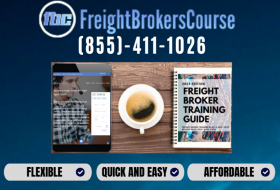Start a Freight Broker Business: The conventional freight broker is a middleman who operates in the interest of clients who desire the prompt delivery of goods to a specific location through shipping services that transport freight directly from the manufacturer’s warehouse. The basic function of this multifaceted service is to coordinate the transport of goods through the air, across roads and highways, and on the nation’s waterways.The overall goal of a successful brokerage is to develop a solid foundation built on efficient delivery of goods to the appointed client location.
Instructions
1
Choose an office location. The start-up of a freight brokerage calls for low overhead, a relatively small initial investment, and no large-scale storage requirements. These factors establish freight brokerage as the ideal home-based business. If you operate a freight brokerage from home, you should check with the local business registration office to determine what local tax considerations apply. Contact information on your business registry can be found online, on the main campus of many community colleges, or in the blue (government) pages of the local phone book.
2
Pick a market segment. Determine your business focus by establishing the particulars of your service for pricing and promotion purposes. Some freight brokers carve out a niche by dealing specifically with large vehicle ground transport. Some may distinguish their service by offering the delivery of a specific product type. For others, the use of shipment weight limits are employed to enter a targeted market segment.
3
Build a database. Record phone numbers, web addresses, and the names of key personnel from shipping companies, carrier organizations, and freight forwarding services. These freight and transport organizations will provide support and service for the lifetime of your business. Your database of contacts and affiliate companies can be maintained by computer database or by using a detailed paper filing system. Numerous well-defined national directories of transportation-related companies are available online, in the local phone book, in major bookstores, or within the business directory section of the public library system.
4
Obtain the proper registration and bonding. The Unified Carrier Registration Act of 2005 requires anyone interested in operating this type of business to undergo a revamped registration process. Registration may be completed entirely online at ucr.in.gov, or by mailing a copy of the application printed from the registration website directly to Division of Public Utilities and Carriers, 89 Jefferson Blvd., Warwick, RI, 02888. Many custo
mers may also require that you carry a surety bond of at least $10000 secured from a bank, financial institution or bonding company. You must also submit form BOC-3 to determine what processing agent may be responsible for serving court-related documents to your business if necessary. A completed BOC-3 must be filed with the Federal Motor Carrier Safety Administration (FMCSA). Mail the form to MC-ECC, 1200 New Jersey Avenue SE W63-105, Washington, DC 20590. Check the status of your filing by calling 1-866-637-0635.
5
Generate the appropriate forms and record-keeping material needed for professional correspondence. Federal guidelines following the events of September 11, 2001 dictate that very detailed documentation exist outlining every transaction made during the shipment and transportation of freight in the United States. You will need to provide invoices, contracts, broker agreements, and service bills to customers and peripheral organizations that ship, order, and carry freight in conjunction with your service.
6
File the proper business application or incorporation documents with the appropriate city, state or federal business licensing agency in your area. You must also pay the appropriate fees regarding initial filing, trade name registration, and license renewal, if applicable. Contact information for business registration organizations in your location can be found via state websites, in the government section of the local phone book, and at the public library.
7
Determine your pricing. Many freight brokers consider shipping weight, distance of transport, and scheduled carrier stops important factors in outlining a pricing strategy. Conduct research by contacting established freight brokers, shippers, carriers, and other professionals to gain an understanding of current pricing trends. Use the phone book, or the transportation industry directories available on the Internet to locate industry contacts for research purposes.
8
Promote your business. Develop a relationship with carriers, import-export brokers, shippers and other organizations that operate in the freight transportation domain. Network with these potential customers by attending industry trade shows, conferences, and training events. You may also make use of print advertising in the form of fliers and ads placed in periodicals. Work toward developing a website with links to other industry websites and online publications.







